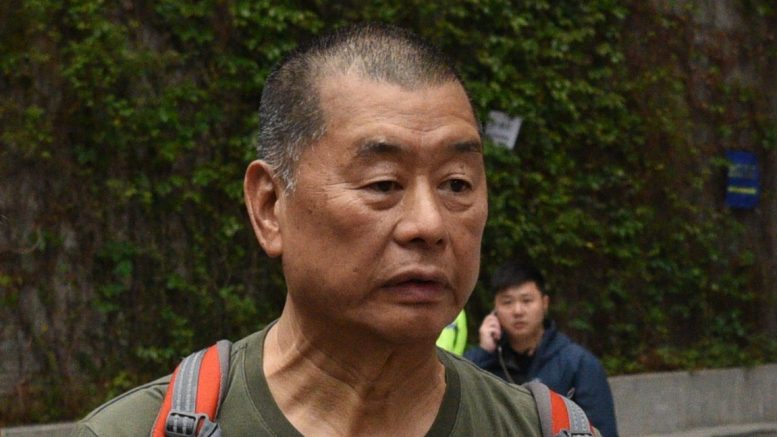By Chris Yeung —
Amid threats of sending national security defendants to mainland China for trial, Hong Kong’s security minister Chris Tang Ping-keung said last week he was confident the open hearing of the trial of Apple Daily founder Jimmy Lai Chee-ying would reveal the extent of the “bad” crimes of Lai had allegedly committed.
He did not comment directly in the interview with the South China Morning Post about whether the Lai trial should be conducted in the mainland, where cases that involved national security had been held secretly.
Calls for invoking a provision in the Hong Kong national security law on the trial of national security defendants in the mainland have surfaced in the wake of a newly-proposed bill of sanctions against 49 Hong Kong officials, judges and prosecutors by US lawmakers.
Tam Yiu-chung, the former sole Hong Kong member to the National People’s Congress (NPC) Standing Committee, said the bill might “force” the government to transfer cases to the mainland.
He echoed warnings from Regina Ip Lau Suk-yee, convenor of the key decision-making Executive Council, and pro-Beijing heavyweight Lau Siu-kai that the US move could trigger “fallback measures” under Article 55 of the national security law.
Asked by reporters after attending a legal conference on Friday, Secretary for Justice Paul Lam questioned why people have no confidence in local courts in handling national security cases. He did not directly comment on the idea of sending those cases to the mainland.
The two major Beijing-backed Chinese dailies, Ta Kung Pao and Wen Wei Po, which are often indicators of Beijing’s thinking, have not given extensive coverage to the warnings given by the various pro-Beijing political heavyweights.
If the Chinese authorities have kept their cards close to their hearts, it is plainly because of the hyper-sensitivity and the profound implications of the idea of sending Lai to the mainland for trial.
Article 55 stipulates the central government’s national security office in Hong Kong, or Office for Safeguarding National Security (OSNS), can exercise jurisdiction over Hong Kong national security law cases. It could do so when the cases are complex that involve foreign countries, a situation which rendered the Hong Kong government unable to enforce the law, or when “a major and imminent” threat to national security occurred.
After a case is being transferred to the OSNS, Beijing could assign a prosecuting body and a court to hear the case. Relevant mainland Chinese laws would also be applied.
Lau, an adviser for semi-official Beijing think tank the Chinese Association of Hong Kong & Macau Studies, said Article 55 was a “last resort” and could be used if foreign forces were found to be interfering in those cases. He did not specifically name the Jimmy Lai case.
Article 55 has not been applied since the law took effect on July 1, 2020. With no precedent ruling, whether the pressure mounted by a list of foreign governments, legislators, human rights groups and religious leaders constitutes “interference” stipulated in the article is a matter of interpretation of the law.
But any decision to take the case off from Hong Kong courts to the mainland will be entirely based on political consideration.
Pro-Beijing pundits such as Lau and Regina Ip may feel adamant putting Lai on trial under the mainland system could help keep the Hong Kong judiciary clean from the complex political mess caused by the Lai case, not to mention the pressure the local judges may face.
And if the hearings are being held behind closed doors, the publicity of the defence of Lai in the process could be kept to the minimum, if any.
That may sound like a smart political play, being justified by Article 55. But ironically, it contradicts Chris Tang’s pledge of open hearing of the Jimmy Lai case.
More importantly, it will create more uncertainties and complexities to the case. There is no previous case of a trial already prepared scheduled to be held in a Hong Kong court being handed over to the mainland authorities.
How it should and can be done is a big question mark with no one seems to know the answer. It is easier said than done.
Worse, it will set a bad precedent for the Hong Kong judiciary giving up its final power of adjudication, which is one of the pillars of independent judiciary and the “one country, two systems” policy as a whole.
The “last resort” in the national security law Lau Siu-kai was referring to could indeed be a self-destruction device. Any threat of use must be seriously thought through with a clear idea of the potential destruction that it may cause. The loss caused by a relocation of the trial to the mainland will be far greater than the so-called gain.
This article was first published on Green Bean platform.


Be the first to comment on "Sending Jimmy Lai case to mainland a bad idea"